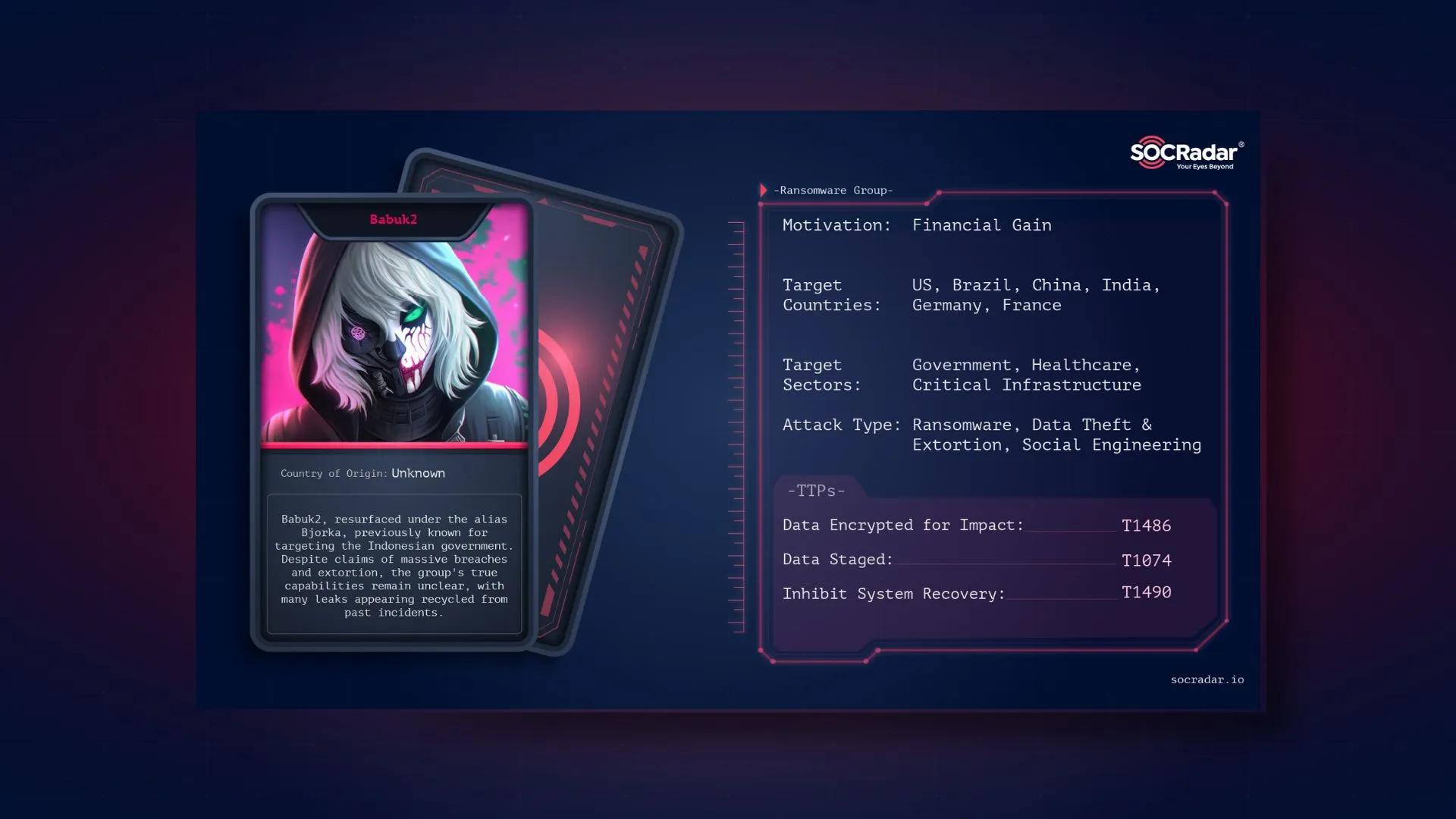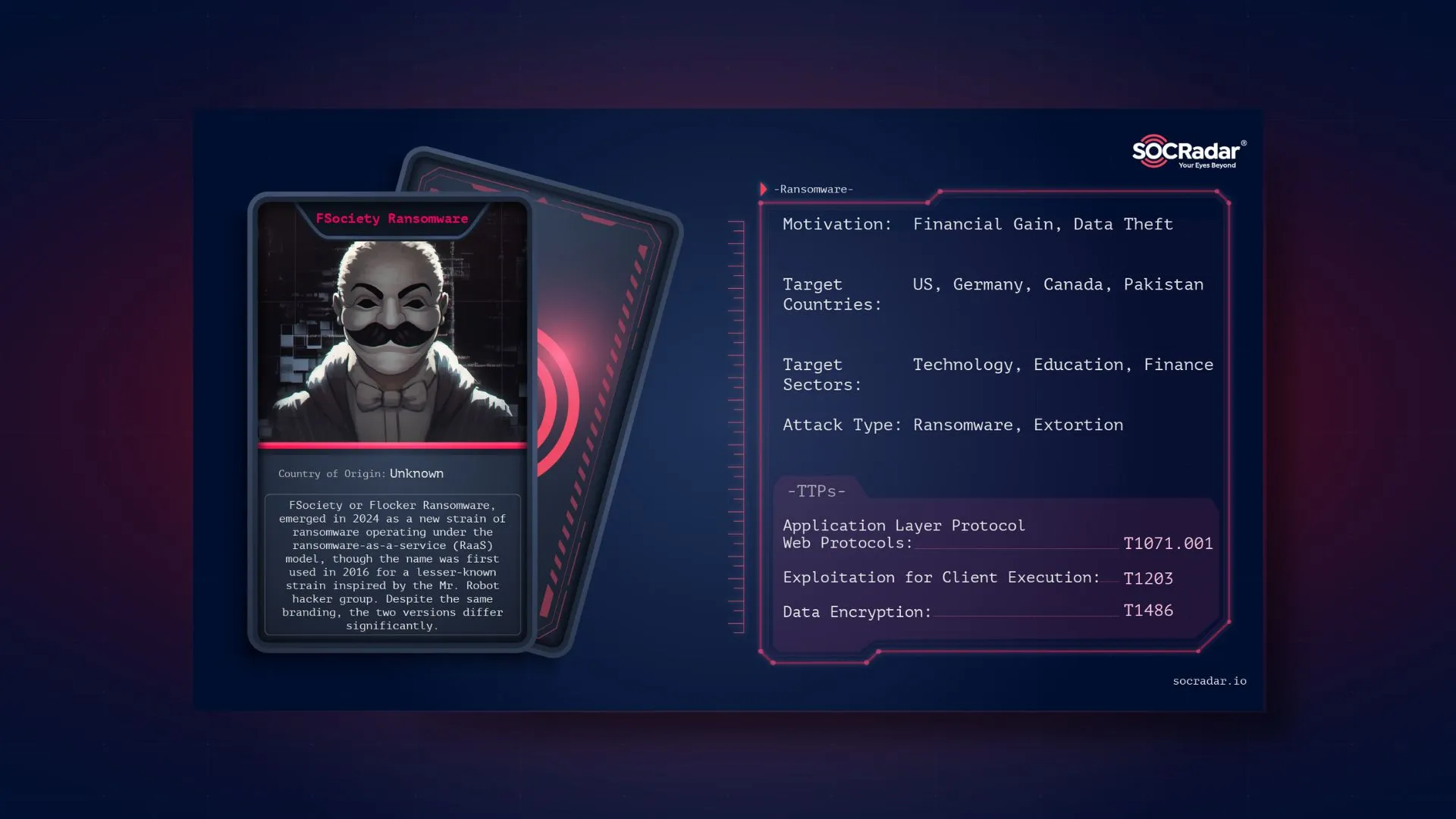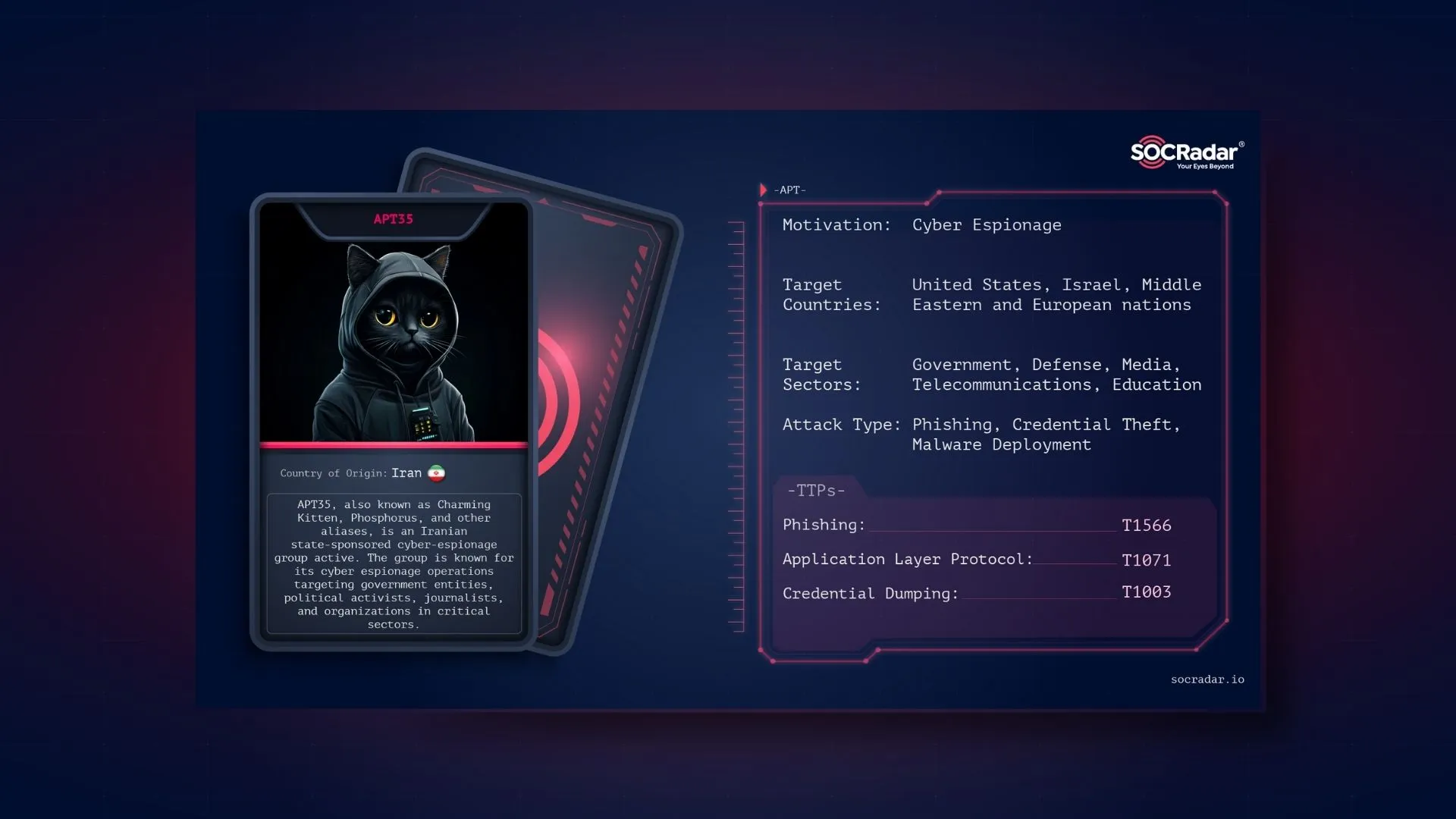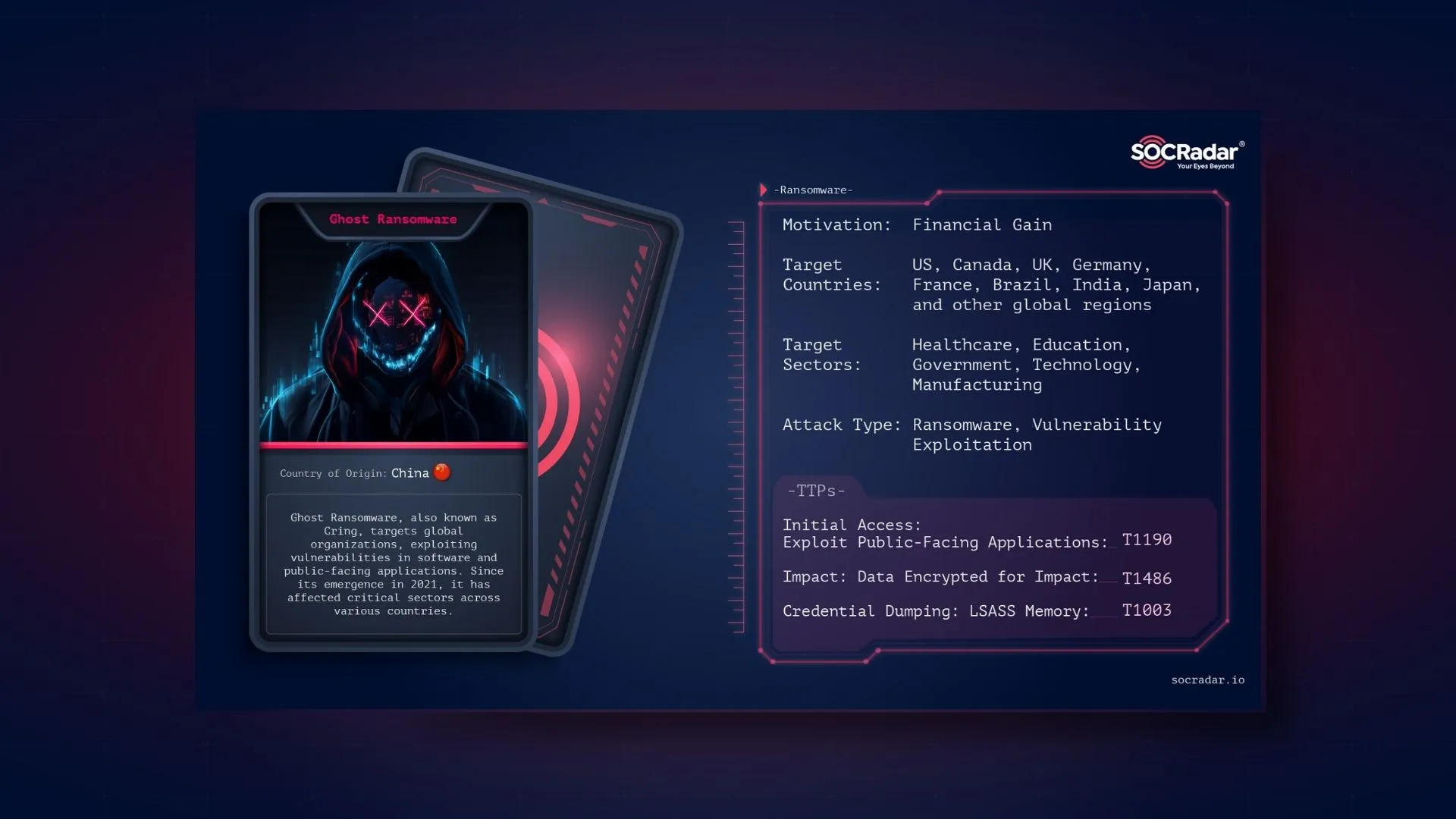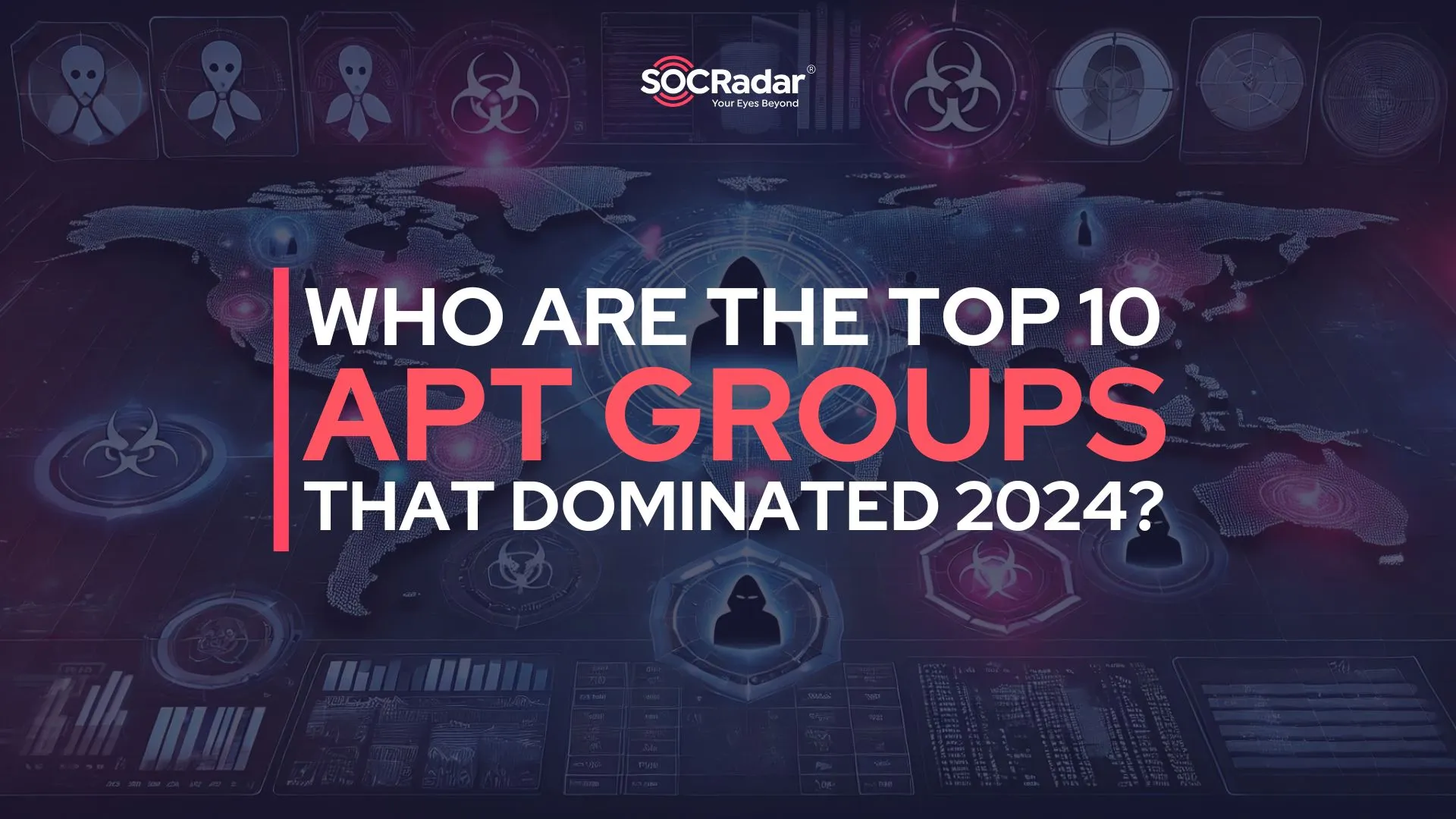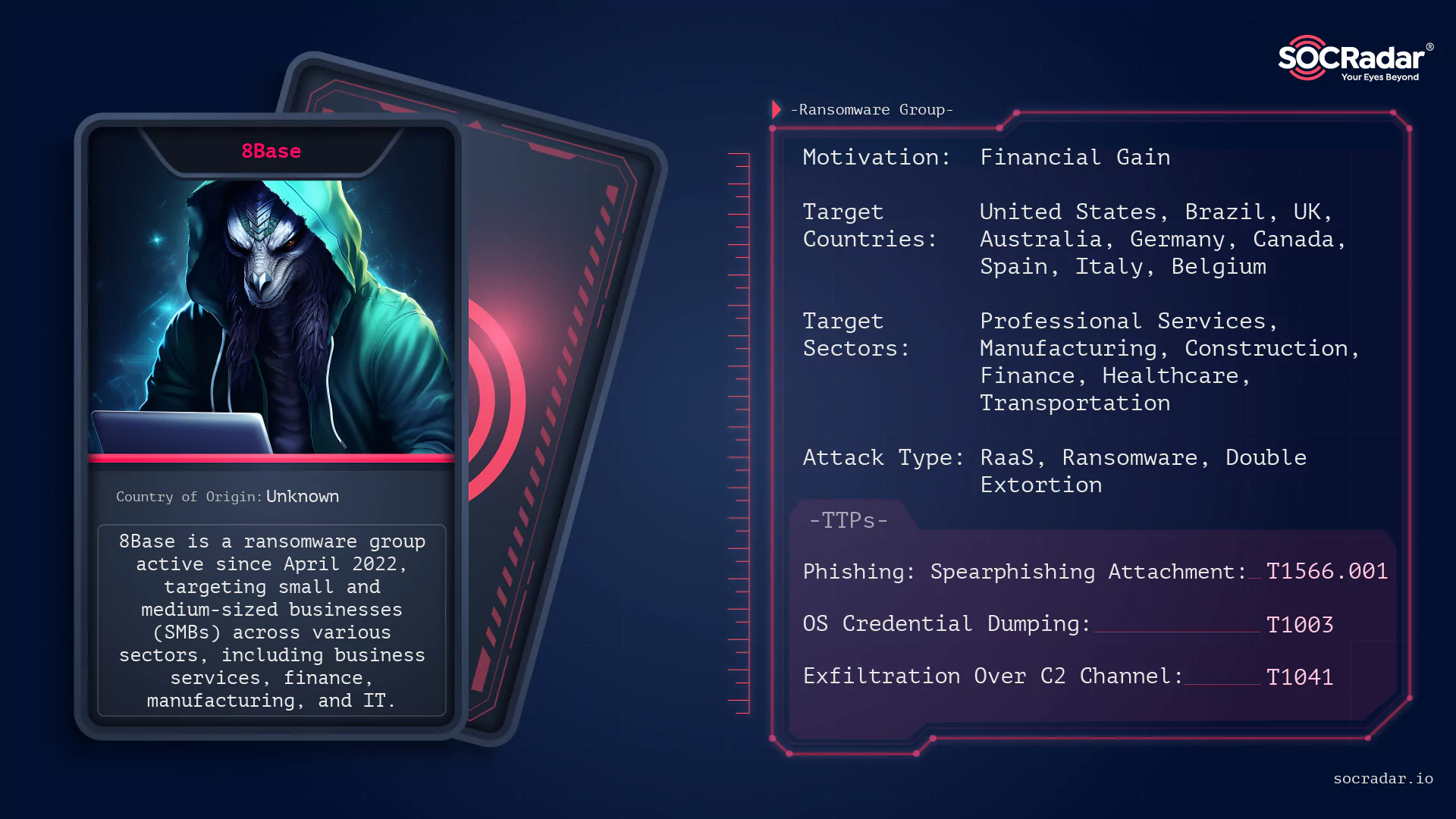
Dark Web Profile: 8Base Ransomware
In today’s cyber world, while the ransomware scene remains dynamic and active, new actors are emerging with significant numbers of victims. In this article, we will focus on 8Base Ransomware, which ranked in the top 5 most active groups last month according to Daily Dark Web, with 37 victim announcements in June.
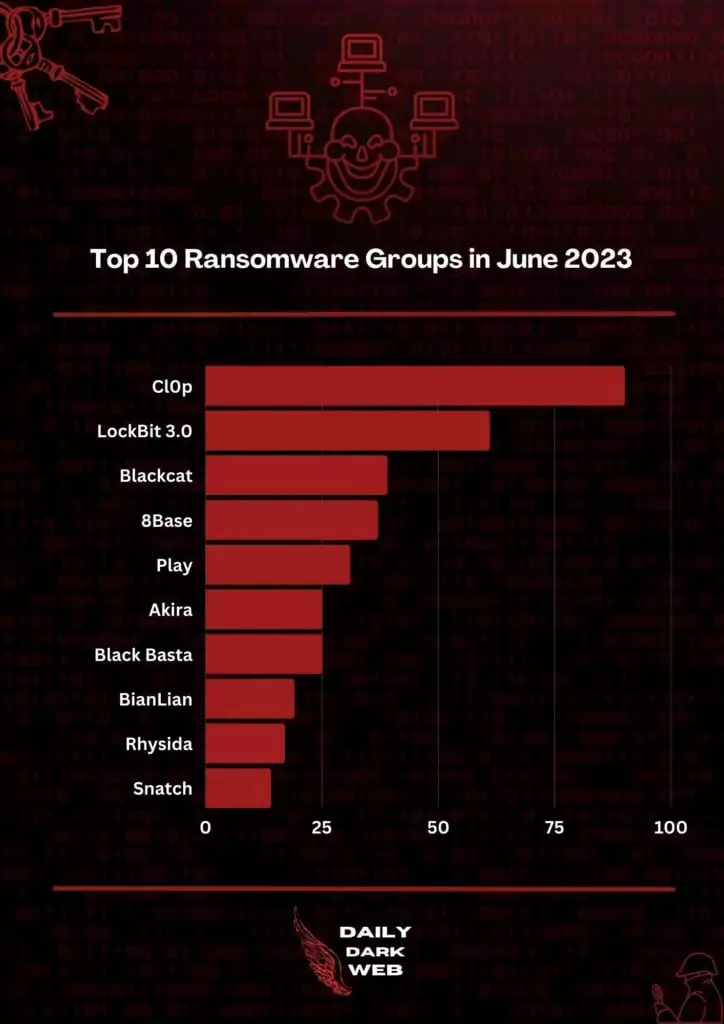
Who is 8Base?
8Base is a ransomware group that has been active since April 2022. Despite its relatively recent emergence, the group has rapidly gained notoriety due to its aggressive tactics and the significant number of victims it has claimed. The group primarily targets small and medium-sized businesses (SMBs) across various sectors, including business services, finance, manufacturing, and information technology.
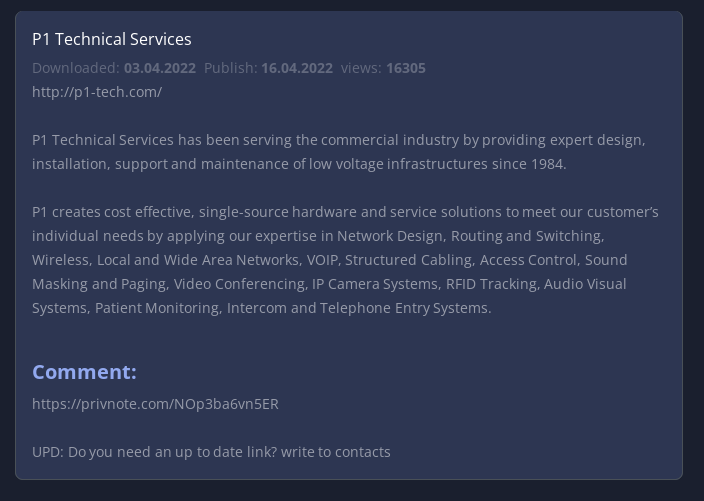
The group’s identity, methods, and motivations largely remain a mystery. However, based on its leak site and public accounts, along with the group’s communications, researchers think the group’s verbal style is quite similar to that of RansomHouse, a group that typically purchases already compromised data or works with data leak sites to extort victims. This has led to speculation that 8Base may be an offshoot of RansomHouse.
Another point of view is that 8Base was built directly with the leaked Babuk builder:
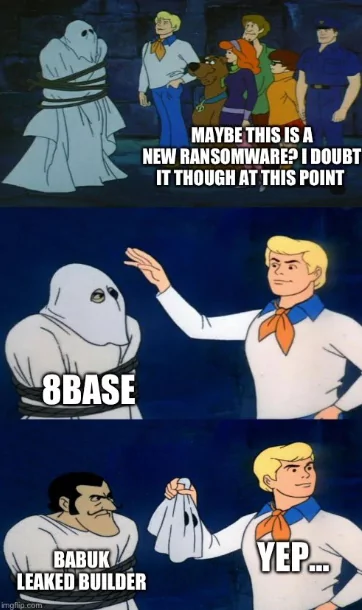
Putting everything else aside, the group’s rapid rise in activity and the significant number of victims they have claimed have made them a major player in the ransomware landscape. They have been particularly active in recent months, with a significant spike in their activities observed. This has led to them being ranked as one of the top performing ransom groups, further highlighting the threat they pose.
How Does 8Base Ransomware Attack?
8Base is known for its double-extortion tactics. The group threatens to publish the encrypted files unless the ransom is paid, aiming to embarrass the victim by exposing private or confidential information that could damage their brand or reputation. The use of the “double-extortion” tactic has become increasingly common among ransomware groups, as it adds an additional layer of pressure on the victims to pay the ransom.
The 8Base ransomware is thought to spread via:
- Phishing emails,
- Exploit kits.
If you are suspicious that an email you have is phishing, you can use SOCRadar’s Phishing Radar tool, available for free under LABS:
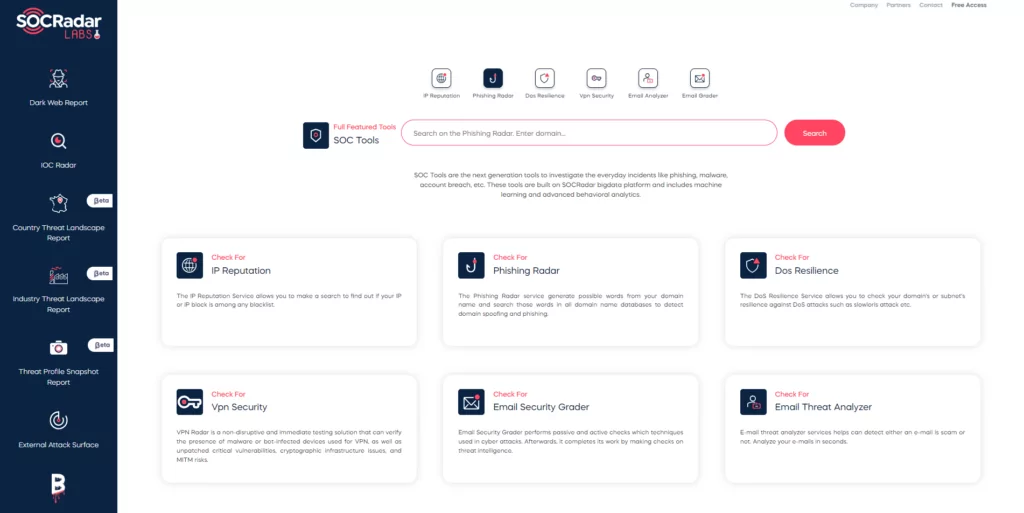
Which tools and vulnerabilities does 8Base Ransomware use?
8Base uses a variety of ransomware strains, including a variant known as Phobos. The group has customized Phobos by appending ‘.8base’ to their encrypted files, but the format of the entire appended portion remains the same as Phobos, which includes an ID section, an email address, and then the file extension. This suggests that 8Base is leveraging Ransomware-as-a-Service (RaaS) offerings, a common practice among ransomware groups.
Quick Look at 8Base Ransomware’s TOR Site
When we enter the group’s Tor website, we are greeted by a homepage with victim announcements section by section and with descriptions underneath.
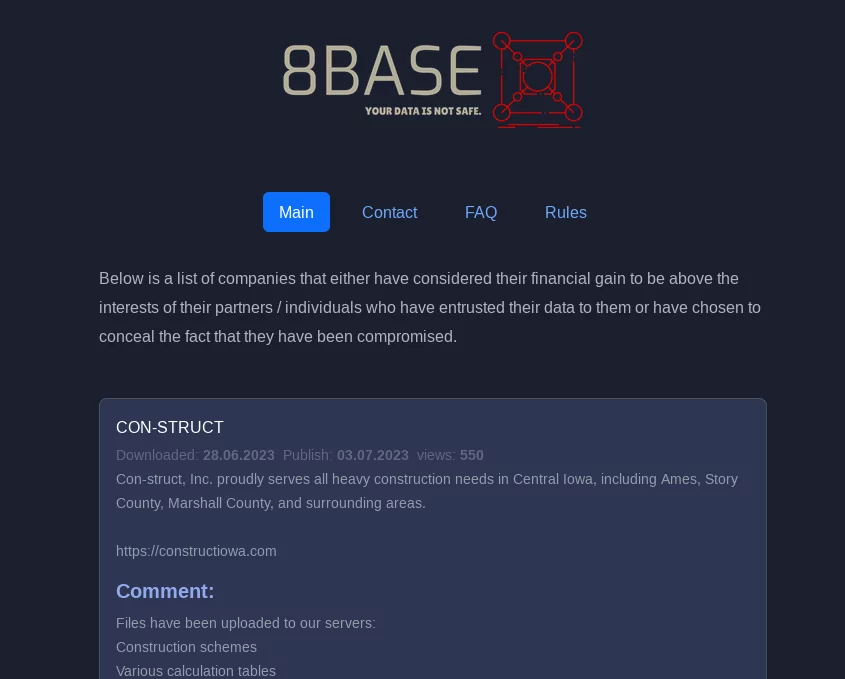
When we go to the Contact section, a standard contact form welcomes us, just like an organization’s website.
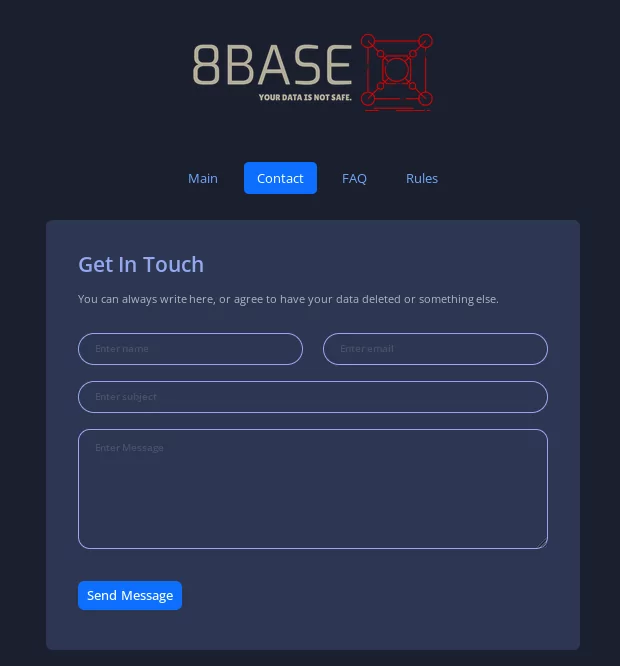
When we go to the Frequently Asked Questions (FAQ) section, we are greeted with a somewhat long article, first of all we learn about the group’s Telegram and Twitter accounts.

From the FAQ text, several aspects can be inferred about the 8Base:
Business-like Approach: This group operates in a structured, professional manner, with clear policies and procedures. They have dedicated channels for communication and even offer customer support, implying they have a well-organized infrastructure.
Cooperation: The group is open to collaboration with others who share their ethos. They suggest willingness to negotiate ransom deals on behalf of others. However, they clearly state their rejection of any association with ultra-radical groups, indicating an attempt to maintain an image of ethicality.
Ethical Line: The group claims to have ethical boundaries, refusing to engage with extremist groups or release data that violate moral principles. They attempt to legitimize their activities by drawing a line between what they perceive as ethical hacking and malicious activities.
Respect for Journalism: They seem to value journalism and have special provisions for journalists, indicating their belief in information accessibility. This could also be a strategy to gain media attention and publicity.
Victim Support: Surprisingly, they claim to offer help to victims of the companies they attack, suggesting that they remove personal data before making it public. They also offer data sets to individuals for potential lawsuits. This could be a strategy to frame their actions as ‘just’ or ‘helpful’ to the public.
Data Disclosure Process: The group follows a process where they first list a company as “Evidence” and later change the status to “Disclosed”. They provide the company an opportunity to prevent data disclosure, indicating a form of negotiation or potential ransom demand. This suggests they primarily aim at financial gain.
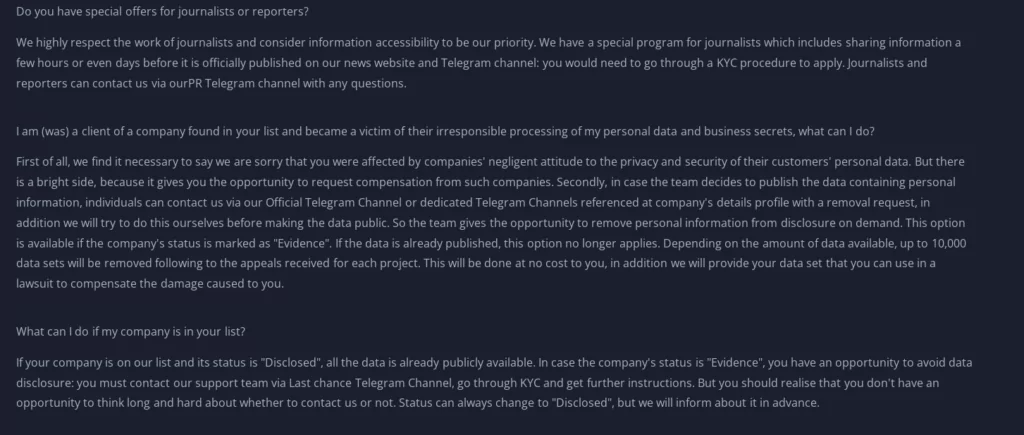
In addition to the FAQ page, there is a sub-page called “Rules.” This page can be thought of as a list of information for victims on how to proceed.
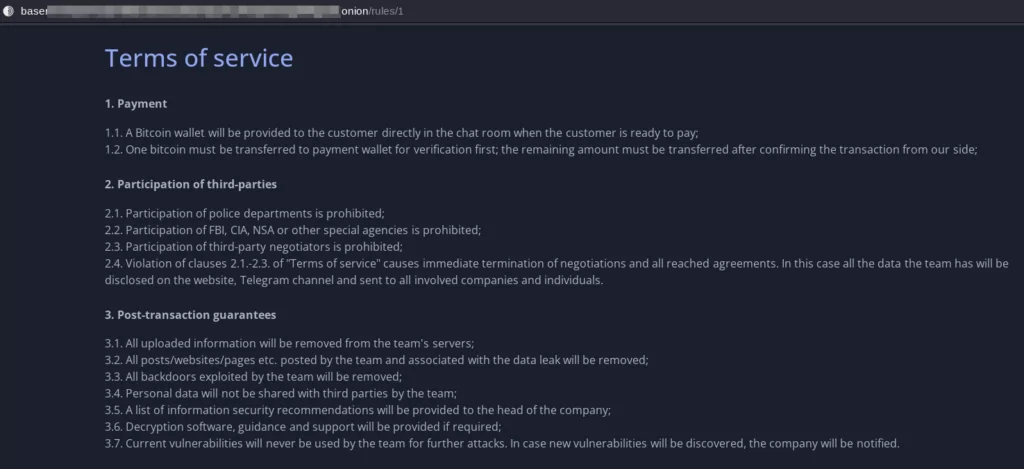
And lastly, we can see the About Us section at the bottom of each page:

SOCRadar continuously monitors the dark web and posts news about ransomware groups under the “Ransomware News” heading on the Dark Web News page of the CTI module:
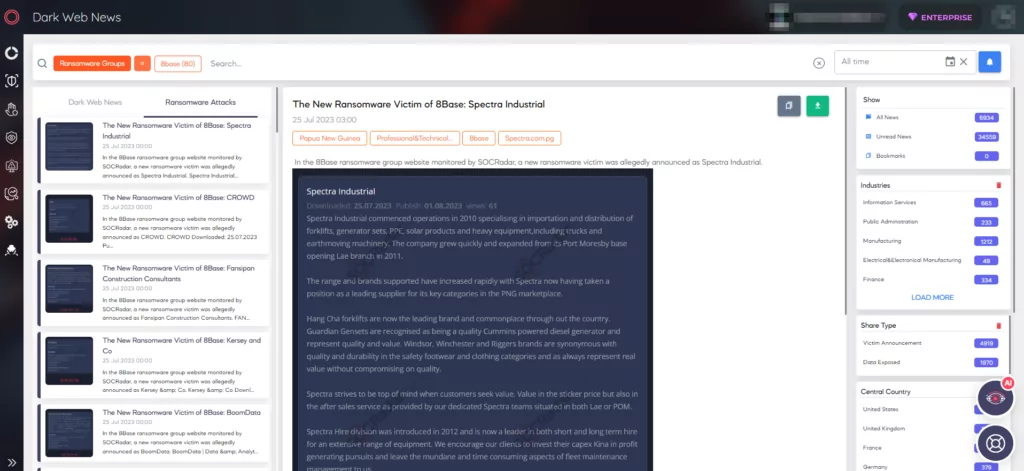
The group’s leak site describes them as “honest and simple pentesters.” The site offers instructions to victims with sections for Frequently Asked Questions and Rules, along with multiple ways to contact the group. 8Base also maintains an official channel on the messaging service Telegram and an account on Twitter, further demonstrating their sophisticated communication and public relations strategies.
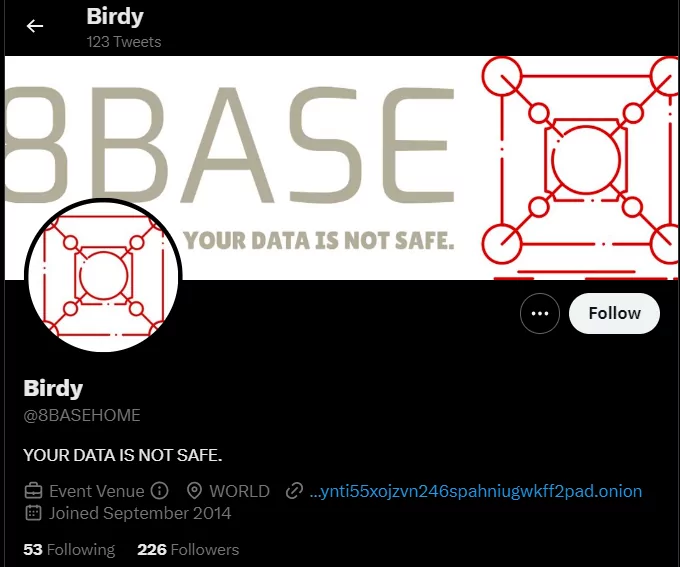
They also share files and new claims on their Telegram pages, which for some reason contradict the “ethical” information they provide.
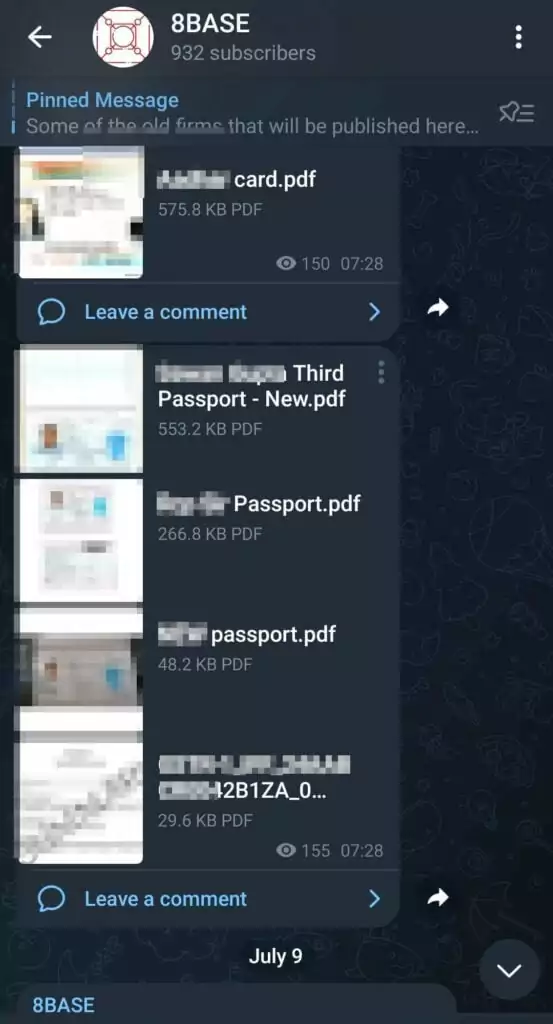
What are the Targets of 8Base Ransomware?
8Base primarily targets small and medium-sized businesses (SMBs) across various sectors. The group seems to have a preference for certain industries, with businesses in the business services, finance, manufacturing, and information technology sectors being particularly targeted. This could be due to the perceived ability of businesses in these sectors to pay larger ransoms, or it could be due to the nature of their data, which may be more sensitive or valuable.
The group’s activities have spiked recently, with the group claiming the second-largest number of victims over the past 30 days, second only to the LockBit 3.0 gang. In May 2023 alone, the group released data from 67 victims they breached between April 2022 and May 2023. This rapid rise in activity and the significant number of victims they have claimed have made them a major player in the ransomware landscape.
Target Sectors
When looking at the companies attacked by the group, most of them are companies that operate under the Professional Services industry such as Accounting, Law and Legal Services, Business Services etc. Apart from Professional Services, companies operating in the fields of Manufacturing, Construction, Finance and Insurance, and Healthcare industries also seem to be affected to a great extent.
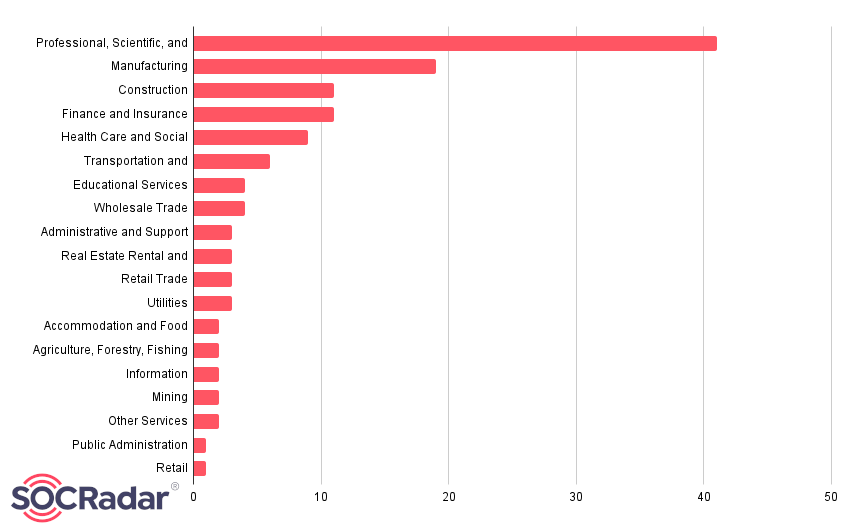
Target Countries
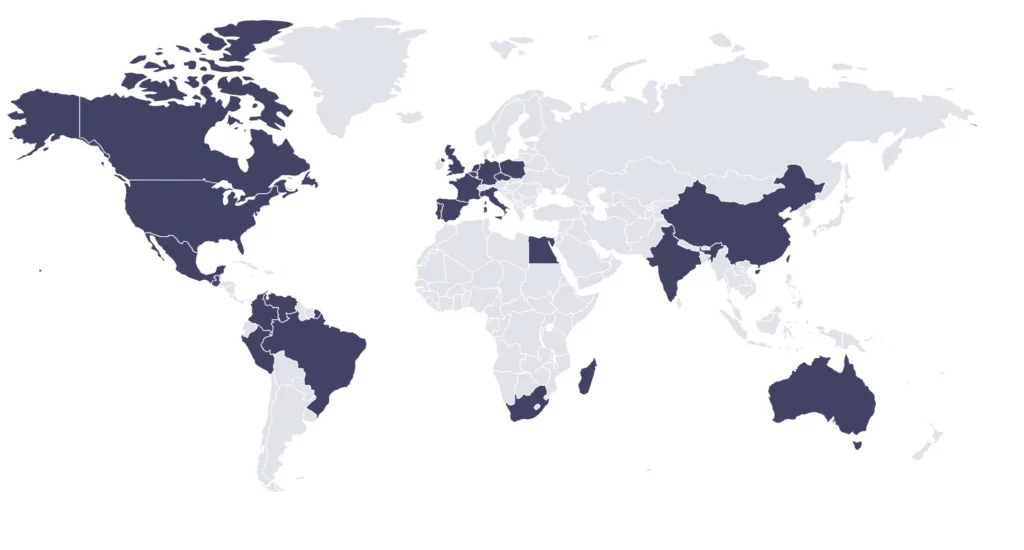
According to the group’s attacks, they mostly targeted companies based in the United States, Brazil and the United Kingdom.
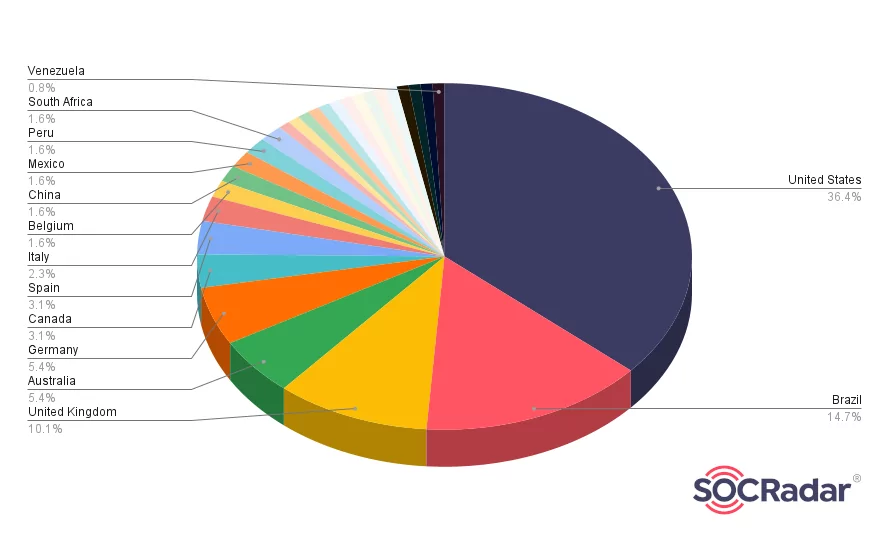
The attack frequency of 8Base Ransomware
As of the time of the research, 8Base, which has nearly 120 claims in total, has been sharing claims in the past, but as of June 4 in 2023, it can be observed that they have been sharing claims much higher than the average in their postings.
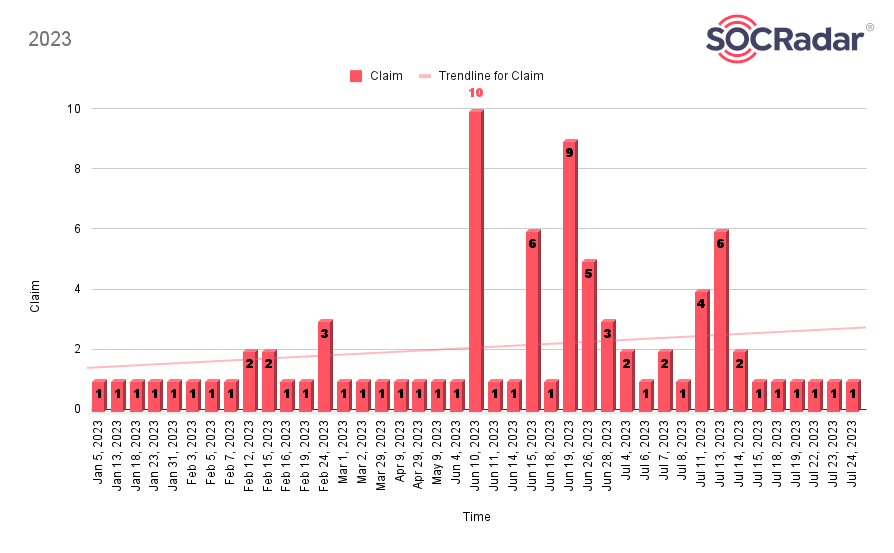
As of April 3, 2022, when the group made its first post, there are a number of claim posts that should not be underestimated during 2022.
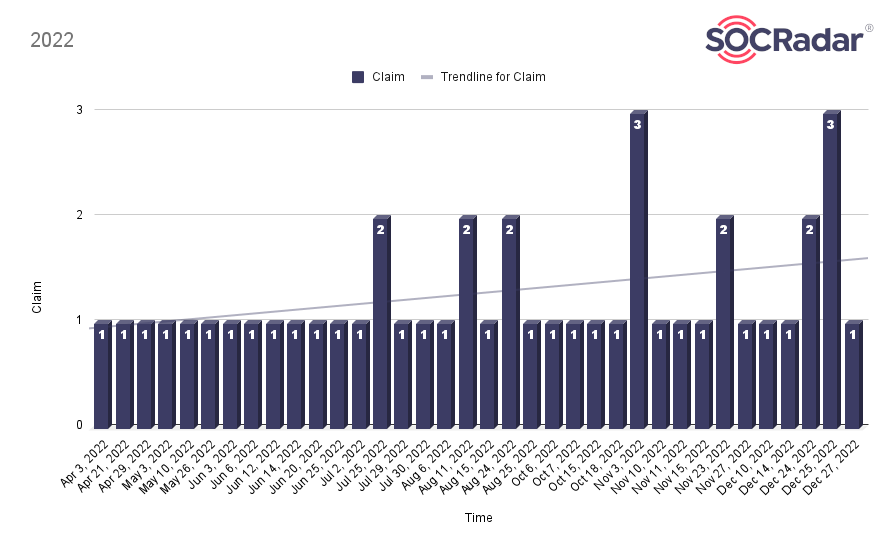
Conclusion
8Base represents a new waveof ransomware groups that are highly active, aggressive, and sophisticated. Their rapid rise in activity and the significant number of victims they have claimed have made them a major player in the ransomware landscape. Their use of double-extortion tactics, where they not only encrypt a victim’s data but also threaten to publish it unless the ransom is paid, adds an additional layer of pressure on the victims and makes their attacks even more damaging.
The group’s use of Ransomware-as-a-Service (RaaS) offerings and their sophisticated communication and public relations strategies further highlight their capabilities. Their ability to adapt and evolve their tactics and tools, along with their aggressive approach, make them a significant threat that businesses need to be aware of.
However, while the threat posed by 8Base is real and significant, it is not insurmountable. Businesses can protect themselves by implementing robust cybersecurity measures, including keeping their systems and software updated, training their employees to recognize and avoid phishing attacks, and using advanced detection tools to identify and respond to threats quickly.
MITRE ATT&CK TTPs of 8Base Ransomware
| Technique | ID |
| Reconnaissance | |
| Active Scanning | T1595 |
| Phishing for Information | T1598 |
| Resource Development | |
| Acquire Infrastructure | T1583 |
| Develop Capabilities | T1587 |
| Initial Access | |
| Phishing: Spearphishing Attachment | T1566.001 |
| Execution | |
| Scheduled Task/Job | T1053 |
| Command and Scripting Interpreter | T1059 |
| Shared Modules | T1129 |
| Persistence | |
| Scheduled Task/Job | T1053 |
| Boot or Logon Autostart Execution | T1547 |
| Registry Run Keys / Startup Folder | T1547.001 |
| Privilege Escalation | |
| Scheduled Task/Job | T1053 |
| Boot or Logon Autostart Execution | T1547 |
| Registry Run Keys / Startup Folder | T1547.001 |
| Defense Evasion | |
| Masquerading | T1036 |
| File Deletion | T1070.004 |
| Modify Registry | T1112 |
| Indirect Command Execution | T1202 |
| File and Directory Permissions Modification | T1222 |
| Virtualization/Sandbox Evasion | T1497 |
| Impair Defenses | T1562 |
| Disable or Modify Tools | T1562.001 |
| Disable or Modify System Firewall | T1562.004 |
| Hide Artifacts | T1564 |
| Hidden Files and Directories | T1564.001 |
| Credential Access | |
| OS Credential Dumping | T1003 |
| Input Capture | T1056 |
| Discovery | |
| Process Discovery | T1057 |
| System Information Discovery | T1082 |
| File and Directory Discovery | T1083 |
| Virtualization/Sandbox Evasion | T1497 |
| Security Software Discovery | T1518.001 |
| Lateral Movement | |
| Taint Shared Content | T1080 |
| Collection | |
| Data from Local System | T1005 |
| Input Capture | T1056 |
| Data Staged | T1074 |
| Archive Collected Data | T1560 |
| Command and Control | |
| Application Layer Protocol | T1071 |
| Web Protocols | T1071.001 |
| Exfiltration | |
| Exfiltration Over C2 Channel | T1041 |
| Impact | |
| Data Destruction | T1485 |
| Inhibit System Recovery | T1490 |
Appendix
IoCs of 8Base:
| IOC Type | IOC |
| URL | hxxp[:]//dexblog45[.]xyz/statweb255/ |
| URL | hxxp[:]//sentrex219[.]xyz/777/mtx5sfN.exe |
| URL | hxxp[:]//sentrex219[.]xyz/777/skx2auB.exe |
| IP | 45.131.66[.]120 |
| IP | 45.89.125[.]136 |
| FileName | 8A26.exe |
| FileName | 8B7F.exe |
| Hash | 9769C181ECEF69544BBB2F974B8C0E10 |
| Hash | 5D0F447F4CCC89D7D79C0565372195240CDFA25F |
| Hash | E142F4E8EB3FB4323FB377138F53DB66E3E6EC9E82930F4B23DD91A5F7BD45D0 |
For more IOCs, you can visit the Threat Actor/Malware page under the CTI module of SOCRadar XTI Platform.






























